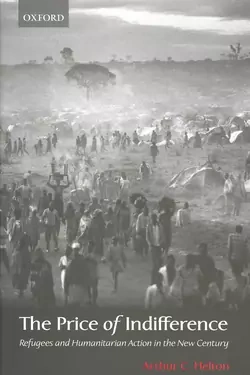Human insecurity is the defining characteristic in the camps around Dadaab. Banditry and violence remain pervasive between the complex network of Somali clans which are represented among both the refugees and the local community. A UNHCR field assistant described a spate of clan-related killings in early 2000. Indeed, Dadaab has achieved sufficient infamy within UNHCR to be used as a subject of a training videotape on security issues. In 1993 the security situation was dire; more recently it had improved somewhat. No convoy has been ambushed since 1998, when there was an attack on the road to Garissa.
Life inside the refugee camp remained disturbed, but the abnormality had achieved a perverse regularity. Bandits lurked and victimized those who dared to venture out. The harsh conditions and violence led a US State Department refugee official to brief me that Dadaab in 2000 was 'hell on earth.' To me, it seemed that Dadaab reflected the prolonged and indefinite character of refugee arrangements in Africa and elsewhere around the world: increasingly a norm by default.
The local Kenyan authorities have a difficult job to maintain security in the camps. The local police chief, who offered us a soft drink at a small table under a shade tree at his ramshackle headquarters, garrulously described the difficulties of his work. Often conflicts between the clans of Somalia were mirrored by conflicts in the camps. 'I am responsible for the physical protection of those in Dadaab', he explained. Police work relating to offences concerning refugees was complicated by the fact that generally Somali leaders preferred to handle the matters themselves through traditional justice practices, including the payment of compensation to victims.
The Dadaab police chief, who oversees the work of some 170 officers in the Dadaab area, was grateful for the support provided by UNHCR, which has funded salary incentives, equipment, vehicles, and buildings for the police. UNHCR's financing of the local police has buttressed both its own security and the security of the camps. As a result, relations between the police and UNHCR are good in Dadaab. UNHCR also provides finance to support a mobile Kenyan court, which convenes periodically in nearby Garissa to hear and decide cases pertaining to both refugees and local people.
The rape of women has become synonymous with the Dadaab camps. When I first visited the camps in April and May 1993, the issue was just emerging as a critical dimension of the insecurity in the camps. A UNHCR rape counsellor then reported 107 cases of rape in the two months before my visit.
As the issue garnered increased international attention, several measures were taken. In particular, live thorn bushes were provided in order to fence the camps to increase their security, a resource shared with the local community. In 1995, the US government funded an initiative to provide firewood to refugees. Many of the rapes occurred when women left the camps to search for firewood in the nearby territory. This initiative has since become a regular UNHCR budget item. When I was in Ifo camp in November 2000, I witnessed a mass firewood distribution.
The provision of firewood in the camps, however, is relatively expensive and funding is available to supply only 30 per cent of the current needs in the camps. Nevertheless, the programme has apparently had an impact in reducing incidents of rape. According to a UNHCR protection officer, from January to October 2000 75 rapes had been reported in the Dadaab camps, up from 71 cases in 1999 but fewer than the 164 cases reported in 1998. Other measures had been taken apart from distributing firewood. The refugees in the Dadaab camps had themselves organized anti-rape committees, giving unusual prominence to an issue that afflicts many refugee camps around the world. UNHCR also refers rape survivors to Western countries for resettlement abroad.
A micro-credit lending program financed by Ted Turner's United Nations Foundation and administered by Cooperative Action for American Relief Everywhere (CARE) has also been defended by its proponents, in part as a way to reduce sexual violence in the Dadaab camps. The lending programme, which targets vulnerable women, provides loans to groups of five women who undertake small-scale enterprises. These endeavours result in earnings which enable women to buy firewood without having to leave the camps, thereby avoiding exposure in the bush to rapists. By November 2000, nearly $1 million had been committed under this micro-lending scheme for women in the Dadaab camps. Repayment rates were nearly 100 per cent. The women with whom I met were quite enthusiastic about the programme, although they allowed that there was some grumbling from men who complained that the women had been singled out for this benefit.


 Online Store
Online Store